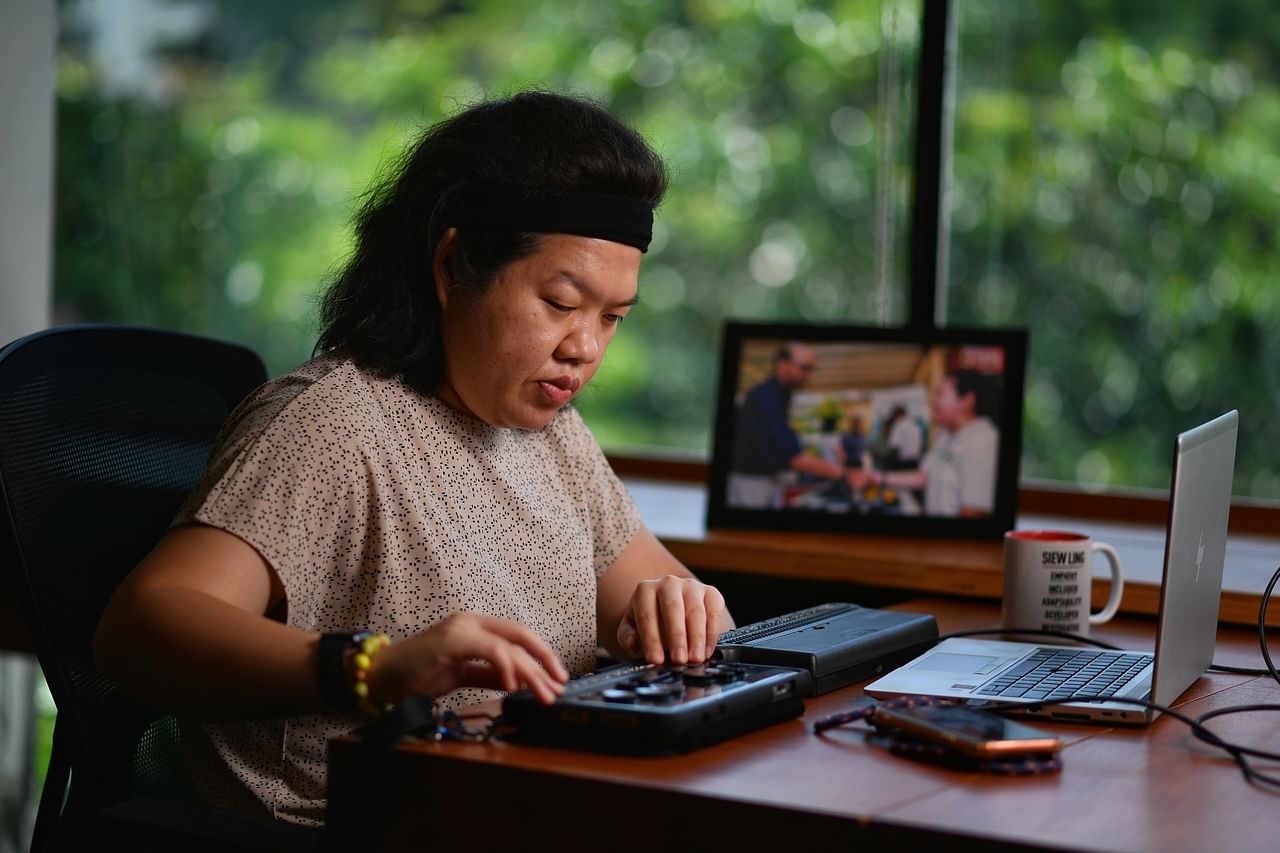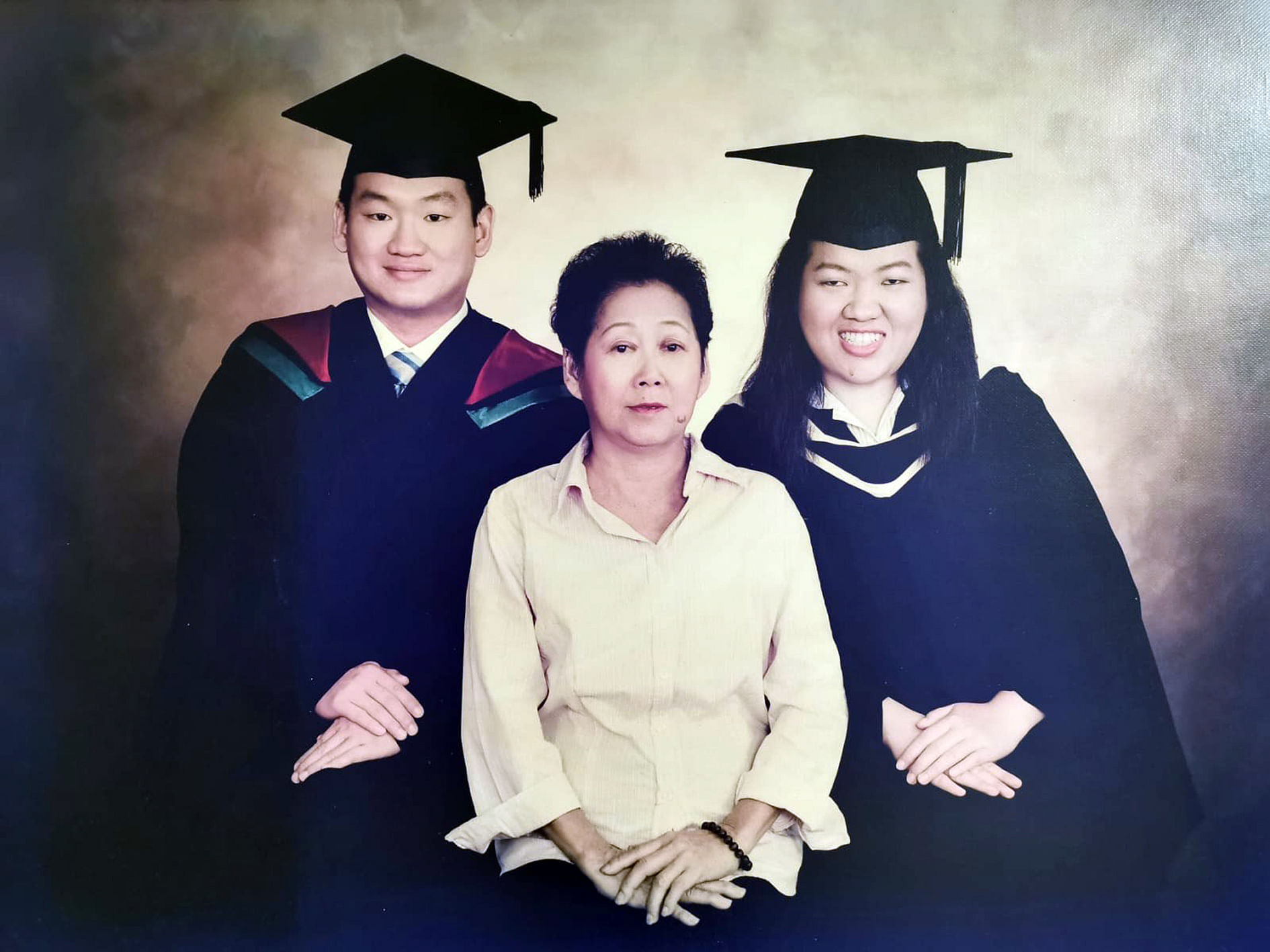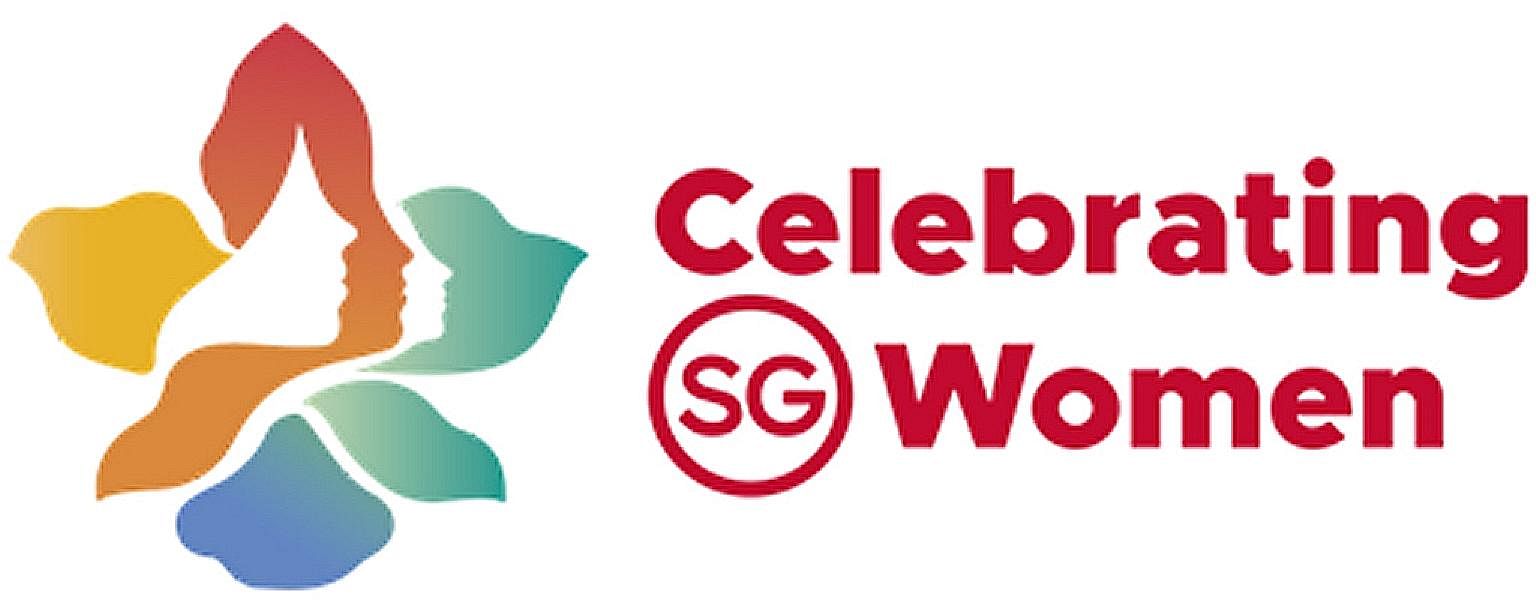Despite losing her sight and hearing, she's optimistic and doesn't admit defeat


Tan Siew Ling has an uncanny ability to remember dates, reeling off with conviction days and months of events that she considers important.
She reckons it is because she is blind. Referring to books or notes to jolt the memory is not an easy option. "I cannot just pick up something and read, I need someone to read it for me and I don't have people around to help me all that often so I have to remember things," she says.
The 33-year-old lost her sight when she was 11. Her life was made even more difficult when she also lost her hearing two years ago.
Her optic and hearing nerves were damaged by tumours in the brain because of a genetic disorder known as Neurofibromatosis Type 2.
Thankfully, she refuses to let her condition dampen her optimism, and is determined to take it on the chin.
She works as an executive assistant in the CEO office at SG Enable, an agency dedicated to enabling people with disabilities.
We are talking with the help of an interpreter who types on a laptop my questions which are then transmitted to a braille device that Ms Tan always carries around with her.
Witty and droll, with a tendency to break out into loud peals of laughter, she says "the universe has been kind to me", adding that she has been blessed with good friends as well as supportive bosses and colleagues who help her face the challenges life has thrown at her.
The first 10 years of her life were happy and uneventful, says the younger of two children of a general worker and a housewife. But things started going awry when her eyesight began deteriorating and the former student of Maha Bodhi School couldn't make out what was written on the blackboard.
Trips to the optician couldn't fix the problem, so she was referred to specialists who said her failing vision was a result of optic atrophy. It was not until much later, in 2017, when doctors discovered four tumours growing in her brain that she was diagnosed with Neurofibromatosis Type 2.
Desperate to save her from going blind, her parents tried all sorts of remedies including making Ms Tan drink potions mixed with burnt talismans prepared by temple mediums.
By 11, she could no longer see. On the advice of specialists, her mother sent her to the Singapore Association of The Visually Handicapped to learn braille. She was also taught how to use a white cane.
Although Maha Bodhi had no resources to help her, she not only completed her primary education but did well too.
"I channelled all my energies into my studies. I guess I did not want to disappoint people like my parents and volunteers who had helped me so much," says Ms Tan.

Her parents were advised to enrol her at the Singapore School of The Visually Handicapped, now known as Lighthouse School, but Ms Tan chose to continue her secondary education at Bedok South Secondary.
"Those were some of the happiest times of my life. There were other students with visual impairment and the teachers had experience," she says.
Life, however, was to deal her more blows. When she was 13, her father died.
"He had medical issues although I don't know what happened to him. In the last few months before he died, he was on a feeding tube," she recalls.
The responsibility of keeping the family together fell on her elder brother who was then only 16 and studying for his O-level exams.
"My mother's health suffered. We didn't have the finances to get that fixed so her diabetes and hypertension caused her to have renal failure when I was 19. She needed dialysis," recalls Ms Tan, who relied on scholarships and bursaries to finance her education.
Life was difficult but she drew strength from role models like blind research scientist Yeo Sze Ling.
Now working at the Agency for Science, Technology and Research, Dr Yeo started losing her sight at four but went on to earn three degrees, including a PhD in mathematics. In 2013, her resilience and grit saw her lauded by Prime Minister Lee Hsien Loong in his National Day Rally speech. That same year, Her World magazine named her its Young Woman Achiever.
In an interview with Her World then, Dr Yeo said her first volunteer project at university was teaching Chinese braille to Ms Tan.
In fact, it was largely because of the researcher's efforts that her charge became the first blind person in Singapore to pass the Chinese O and AO-level exams in 2003 and 2005, respectively.
Ms Tan says: "I call her Sze Ling jie jie (elder sis). She has been with me since age 13 until today. If I have any problems, I go to her."
After her A levels at Tampines Junior College, she worked for a year as braille transcriber before enrolling for a Bachelor of Science course in economics and finance jointly offered by SIM and the University of London.
"I wanted to have a degree because I wanted to improve my financial situation and give my mother a better life," says Ms Tan, who graduated in 2011.
For more than a year after that, she held down two part-time jobs: braille transcriber at Lighthouse and data entry administrator at Citizenship Microsoft Asia, a corporate social responsibility initiative by Microsoft.
When her mother had to have her toes amputated because of diabetes, Ms Tan took on a home-based stint as a market intelligence analyst with executive search firm Chapman Consulting. Her duties including editing thought leadership articles and managing the company's social media accounts.
"Before I knew it, their HR called me," says Ms Tan, who is into her eighth year with the organisation.
Now an executive assistant whose duties include providing secretarial support to the board and handling training administration, she also writes a blog Little Anecdotes Of My Life on the SG Enable website. Prior to this, she handled internship programmes and also organised training workshops for people with disabilities.
She says: "SG Enable really walks the talk. My bosses and co-workers were willing to redesign jobs and accommodate my needs."

Praising her strong sense of responsibility, Ms Ku says: "Siew Ling impressed me with her resourcefulness and grit. These are qualities that cannot come from paper qualifications but developed from her life experiences."
Indeed, life continued to lob challenges Ms Tan's way.
In 2015, the death of her mother — whom she loved very much — affected her profoundly.
"When my mum was around, my world revolved around her. When she passed away, I had to reintegrate into society. Learning to ask for help, learning to tell people that I needed help, like 'Can you accompany me for dinner?' It wasn't easy."

Not long after that, she had a medical check-up.
"I wanted to find out what was wrong with me. Besides my visual impairment, I didn't want to have other secondary problems like diabetes and hypertension. I didn't want to be a burden to others."
A visit to the polyclinic resulted in referrals to specialists and scans which led to the discovery of tumours in her brain.
By then, she already had severe tinnitus in her right ear, after not being able to hear in her left ear since her teens.
"There were alot of sounds emitting from my brain: whining, buzzing, chanting, a lot of white noise as though a radio was on 24/7.
"The doctors didn't know how and if things would change in five years. It turned out that they didn't need to look beyond five years. A few months later, I couldn't hear already."
If losing her sight was traumatising, going deaf in 2019 hit her even harder.
Her parents were no longer around to comfort her and she also could no longer do things like take public transport.
"I was devastated. That was how I developed my liking for eating sweet stuff. Because if you cannot be positive from within yourself, go for sugar.
"Sugar will give you this temporary positive stimulus. Waffles and ice cream, I ate that a lot in the initial stages," she says, resorting to self-deprecation to skim over one of the darkest periods in her life.
However, the fighter in her surfaced and she told herself: "My mum is gone, what I need to do is live."
Her determination to press on, she says, is boosted by the love and encouragement of friends and family who are always ready to help and love her unconditionally.
Her 36-year-old brother, Yan Cai, an IT professional, is especially precious to her.
"He spoils me rotten, accompanies me to all my medical appointments, talks to me and has never once complained. He and his wife always drop in on me."
Ms Tan had started running with the club in 2013 but gave it up when her mother died.
Mr See Toh, a 61-year-old former teacher, encouraged her to run again and set up a small specialised support group to run with her every Saturday.
He says: "We worked out a touch system of communication with her — turn right, turn left, slope ahead. Despite that, she had a fall in the first month and suffered a sprained ankle which put her out of action for two weeks. But she's very driven and resilient."
The guides in this group go one step further; they support Ms Tan socially by taking her out for coffee and lunch, hanging out at her place and cooking with her.
Mr See Toh says: "She is quite something. The word defeat does not exist in her vocabulary. She's gone through one thing after another but she always picks herself up."

Life with a double disability is far from easy, says Ms Tan, who lives with a relative and who can whip up simple dishes on her own.
"I've never dated, but I harbour a small hope of finding a companion and settling down."
Candidly, she says she still struggles with being deaf-blind.
"Mr Wong, there is no such thing as getting over it. What you can do is adapt, cope and live with it."
•Join our Conversations on Singapore Women's Development at this website. Show your support for the Celebrating SG Women movement. Visit this website to discover special deals from our partners.
This article was first published in The Straits Times. Permission required for reproduction.